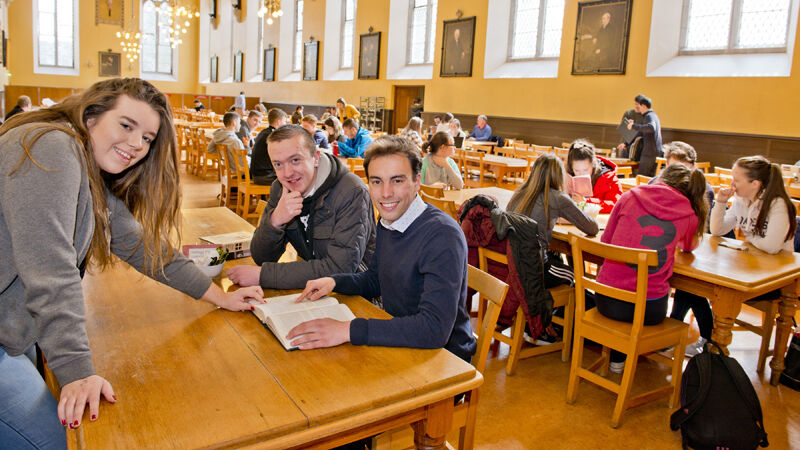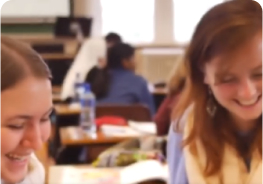Thinking about Maynooth?
Frequently Asked Questions
Home / Frequently-asked-questions

Whats on Your Mind?
The word “theology” comes from two Greek words: theos meaning God and logos meaning word. Together, they mean “speaking about the divine”.
Theology, as a field of academic study, refers to the disciplined inquiry into the religious dimension of human experience. It also has a more limited sense, in examining the beliefs of a particular religious tradition and community.
The study of theology involves so many aspects of people’s lives. Therefore it reaches across many subjects, including philosophy, history, the arts, and the social sciences.
Ultimately the study of theology deals with the fundamental nature of reality. It challenges those who study it to examine and clarify their own religious beliefs, values, and practices. It engages the whole person in a journey toward understanding and self-discovery.
Yes. In fact, this is our most popular programme. Students may complete Theology as a major while also taking other Humanities of Arts subject within a suite of possibilities. Students, for example, choose Philosophy, Law, Sociology, Nua-Ghaelige and many others. Studying Theology in this way help broaden horizons and can give an advantage to students in finding jobs or applying for postgraduate programmes. A full description of the programme can be found here.
Full list of subjects are available here
These subjects are taught with Maynooth University. We share the same campus. To find out more about these subjects, check www.maynoothuniversity.ie
Yes! We can provide Campus Accommodation to our Theology students. However, if we have high demand in any given year the places many be limited. The typical cost of the Village Campus Accommodation includes heating, ESB, Water, WiFi etc. Specific costs may vary from year to year, contact us directly. If a student qualifies for the SUSI grant this can help with the cost. Also, there are various meal plans available on campus, which are very economical and can be tailored to your needs. It’s worth checking out.
Students who graduate in theology are trained to investigate and interpret human experience using a range of perspectives and methods. They learn how to critically engage with the beliefs and actions of individuals, faith-communities and societies. By doing so, Theology Graduates will have developed their written and oral communications skills. All of these abilities are important for success in post-graduate studies and employment.
Theology Graduates tend to be unique individuals with highly diverse career interests.
- Many prepare for teaching at either primary or secondary level. Others go on to have careers at university level.
- Others students take on a ministry. They go on to take positions in churches, social service agencies, or other religious organizations. A few can go on to join seminary in order to consider ordained ministry.
- Most of our students combine Theology with another field of study. Therefore many will go on to work in areas commonly associated with their parallel subject: for example, social work, history, education, counselling, and law.
- Some Theology Graduates take a gap-year working as a volunteer with religious or social service programmes, at home or abroad, while exploring their career options.
- Finally, some students study Theology as an important part of their own personal growth and deep interest, while taking a second subject in another field that offers a more predictable career path.
There are many career paths one can take following a degree in Theology and Arts (Bath MU001). This can depend on the various subject one takes with Theology. For example, our students have gone on to many of the following careers:
Teaching (primary, secondary level), Lecturing, Business, Finance, Chaplaincy, The Civil Service, The Gardaí , Social Services , Private and Public Sectors , Marketing, Communications, Journalism, Pastoral Work, RE Project Co-ordinator, Publishing, Community Development, Public Relations and many more.
Students who graduate in Theology are typically bright, motivated people. Whether they are school leavers or mature students, in common, they like to think through the vital questions of human existence.
Some undertake their academic studies because of a personal engagement with religion. However, the programme also includes students who have only an academic interest in theology.
While Theology at Maynooth is within the Roman Catholic tradition, students from any religious tradition (including non-Christian traditions), or indeed none, are welcome in the program.
What is required most of all is curiosity and self-motivation.
For undergraduates, the best preparation is a broad second level school education. It is not necessary to have undertaken Religion to Leaving Certificate level.
For postgraduates, the minimum of a 2.1 at undergraduate level is required for most programmes.
For international students, there are minimum English Language Requirements.
The Faculty of Theology offers a wide range of modules that cover most of the topics normally included in the academic study of theology.
- Some modules will consider a particular religious tradition, text, or thinker.
- Other modules will trace a particular question or theme across a variety of sources.
- Still other modules examine the relation between religion and other realms of thought (science, philosophy, art, etc.)
- Finally other modules explore the private beliefs and practices of individuals.
To learn even more, click here to search our Courses.
To graduate in a fulltime undergraduate programme in Theology as a single subject requires 180 credits (ECTs) over three years. The programme also includes several modules in Philosophy, to help student’s capacity for critical thinking. Students will have the freedom choose from a wide range of electives. A full description of the programme can be found here.
Of course. We would love to encourage you to do consider this possibility. Broadly speaking, there are two opportunities for theology students to study abroad during their time at Maynooth. The first is to undertake an International Degree. This requires a student to study outside Ireland in a recognised university for one year. The second, is to become an Erasmus Student at one of the many recognised universities across Europe. Students who have taken either option report great experiences. For more details, click here.
At undergraduate level, the programmes at the Pontifical University, Maynooth is primarily designed to explore the intellectual dimension of religion, rather than providing hands-on training in ministry.
However, Maynooth does provide pathways for students who would like to work in ministerial or pastoral leadership. Ordinarily, such students might go to seminary or undertaken a ministerial training program. Both are offered at Maynooth. If you are interested in ordained ministry, it is best to contact your local diocese or the religious congregation which you feel a call. For father details click here.
If you are interested in lay ecclesial ministry – such as chaplaincy, parish work and so on – Maynooth offers a nationally recognised pastoral leadership programme. For further details click here.
First of all, a welcome! Our small community on a large campus means that you will be joining a wonderful learning community.
Secondly, expertise! The Faculty of Theology at Maynooth is the largest Theological Faculty in the Catholic tradition in Ireland and Britain. This allows us to cover the full range of topics that comprise the discipline of Theology.
Thirdly, an international flavour! Alongside faculty members from the UK, South Africa and the US, nearly all our Faculty have studied outside Ireland. All hold doctorates from leading universities, including Tubingen in Germany, The Gregorian in Rome, Italy and The Catholic University of America, Washington DC.
Fourthly, they are professional! They are all are professional scholars who write books, publish articles, and present papers on a regular basis. For more on the background and interests of particular faculty members, see the Staff page.
Fifthly, they are committed teachers! All of the members of the Faculty of Theology are committed teachers who work tirelessly to make their classes interesting and engaging.
Finally, they are available! Theology classes at St. Patrick's are academically challenging, but faculty members are available at any time to help students with course work and to discuss their personal concerns.
If there is anything else on your mind
For Undergraduate queries, please contact us by
Phone: +353 (0)1 708 4772 Email: admissions@spcm.ie
For Postgraduate queries, please contact us by
Phone: +353 (0)1 708 3391 Email: pgadmissions@spcm.ie
For queries about Professional Programmes at the Centre for Mission & Ministries, please contact us by
Phone: +353 (0)1 708 4778 Email: cmmadmissions@spcm.ie

If you live outside Ireland, check out our dedicated area for international students.
Let’s talk
For Undergraduate queries: email admissions@spcm.ie.
For Postgraduate queries: email pgadmissions@spcm.ie.
For The Centre for Mission & Ministries queries, email: cmmadmissions@spcm.ie.
